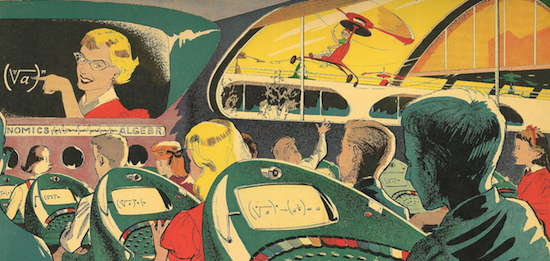Machines are tools and tools can ONLY be tools
Clive Thompson’s reading reminds me of a very interesting question: it is possible that robots or other machines can replace humans as teachers in the classroom in the future? It is not a new question, many fictions, movies, and comics imaged this scene before. Arthur Radebaugh, an American futurist as an illustrator, showed his ideas about the role of machines in the futuristic comic “Closer Than We Think” in 1958 and 1960:
“Tomorrow’s schools will be more crowded; teachers will be correspondingly fewer. Plans for a push-button school have already been proposed by Dr. Simon Ramo, science faculty member at California Institute of Technology. Teaching would be by means of sound movies and mechanical tabulating machines. Pupils would record attendance and answer questions by pushing buttons. Special machines would be “geared” for each individual student so he could advance as rapidly as his abilities warranted. Progress records, also kept by machine, would be periodically reviewed by skilled teachers, and personal help would be available when necessary.”

Arthur Radebaugh’s push-bottom school (Matt Novak, 2013)
“Compressed speech” will help communications: from talking with pilots to teaching reading. Future school children may hear their lessons at twice the rate and understand them better!

Arthur Radebaugh’s robot teacher (Matt Novak, 2013)
In most case, we see machines as tools to improve efficiency, and education is no exception. But what is worrying is that robots and machines don’t have human emotion, they follow specific procedures and standardized tasks. Would it kill the curiosity and creativity of the students? If robots and humans can work together as teachers in the classroom, then where are their boundaries? Although I strongly support the use of machines to help to teach and learning in the classroom, I object to the machine playing a leading role. Teachers are not only teaching knowledge, their personal charm and thoughts can also affect students’ perception of themselves, the world, and the values. Many people dream of becoming a teacher when they are young, is it because they worship their teachers? However, who will worship a robot? Machines are tools, and tools can only be tools.

